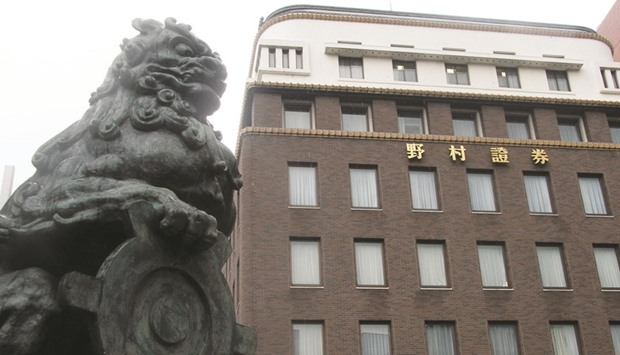For a few minutes after the Bank of Japan (BoJ) announced plans to boost purchases of exchange-traded funds on Friday, confusion reigned on Nomura Holdings’ Tokyo floor as stock traders weighed what the decision meant for equities.
“¥6tn!” shouted one trader, referring to the new annual target for ETF buying. Then, in an instant, thoughts turned to the currency. “The yen’s at 102!” one said. “The exchange rate, wow!” said another.
Now, hours after the BoJ announcement, traders are still grappling with the implications for stocks.
While the limited scope of the stimulus helped send the yen up 3.1% against the dollar on Friday and hurt the outlook for exporter earnings, the almost doubling of ETF buying took away some pain. After a 1.2% gain on Friday, the Topix index slipped 0.1% yesterday.
Equity strategists at Nomura, Japan’s largest brokerage, say they were caught off-guard by the central bank’s move to almost double ETF purchases.
In a July 15 report, strategists led by Hisao Matsuura said it was unlikely the BoJ would only boost ETF buying, without saying why.
Adding to the complexity, they say Tokyo equities escaped a hit mainly because of something that didn’t happen: the BoJ held off on cutting negative interest rates even lower, which was good news for banks’ profit outlook.
The central bank also refrained from adding to its bond-buying programme.
Lenders, which account for about 7.6% of the Topix, have risen 9.6% since the decision for the best performance among the measure’s 33 industry groups. Real estate stocks, which would have benefited from a lower rate, have posted one of the worst declines.
While Friday’s decision was relatively clear-cut for currency traders, it was more complicated for their peers in Nomura’s equity division, who had to work out a lot in the space of seconds. Still, confusion after the decision was quickly replaced by calm.
Nomura allowed Bloomberg to view trading activity on condition that Bloomberg didn’t talk with or name any individual traders.
“Who’s got the BoJ’s website up?” one shouted. The central bank’s website was down after the announcement. “Was there anything with REITs?” asked another on whether the central bank had also increased its purchases of real estate investment trusts.
It hadn’t. With more time to consider, Nomura equity strategists led by Matsuura said the expanded ETF programme will boost the Nikkei 225 Stock Average by about 2,000 points from its current level in the next 12 months. That implies a gain of about 12%.
For their trading counterparts, who don’t have that luxury, Friday was a seat-of-the-pants kind of day.
The decision came later than usual, ratcheting up tension on the trading floor, and even before the BoJ announcement, unusual moves in equity futures had people on edge.
“What’s going on?” one said, after Nikkei 225 contracts in Singapore plunged as much as 3.2% in seconds before largely erasing the decline.
More than 15 minutes after the announcement, one trader summed up the mood of the day, and the challenges facing stock investors, as he assessed one of many market reactions to the list of stimulus programs currently carried out by the BoJ.
“What? Really? Why?” he said.

The headquarters of Nomura Holdings is seen in Tokyo. Equity strategists at Japan’s largest brokerage said they were caught off-guard by the central bank’s move to almost double ETF purchases.
